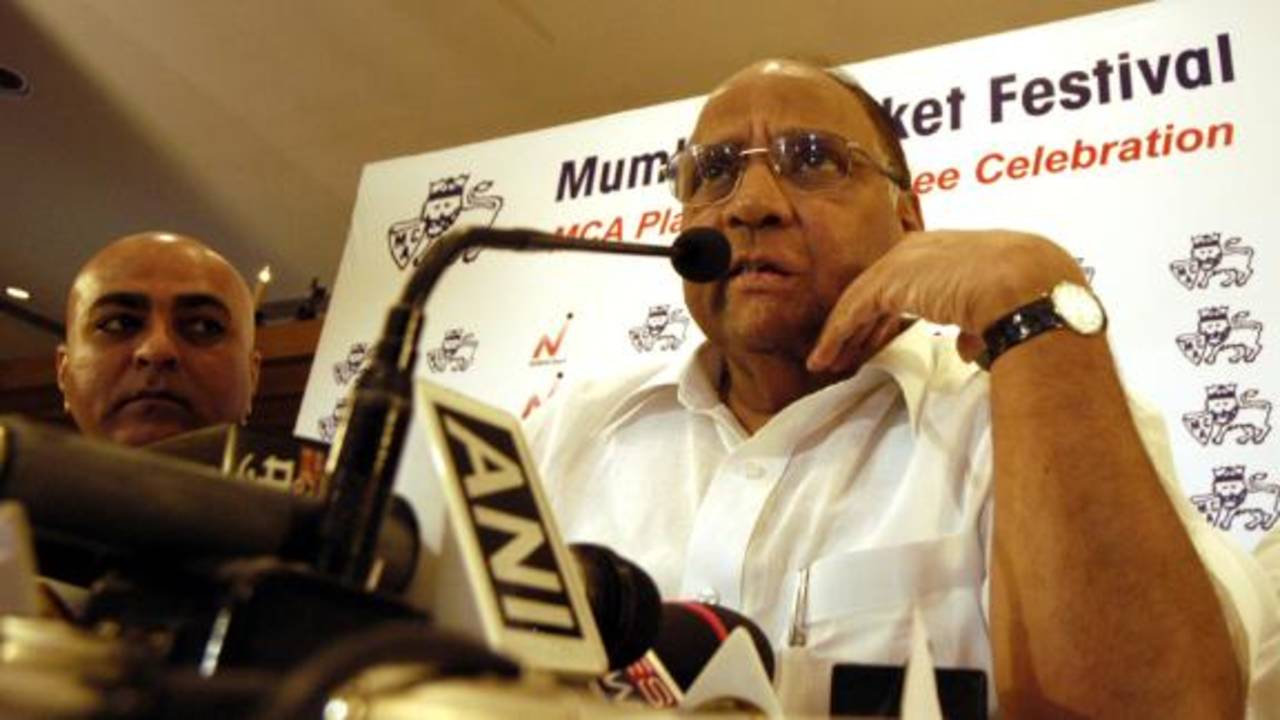The shake-up of India's cricket administration in the wake of the Lodha Committee's reforms continued as veteran administrator
Sharad Pawar announced that he will step down as Mumbai Cricket Association (MCA) president within six months.
The Lodha Committee had recommended, among other things, that there be caps on age and duration of tenure of elected office bearers of the BCCI and state associations. These proposals were
signed off on by the Supreme Court on July 18, and Pawar does not qualify on both grounds, being over 70 years of age and having served as an office bearer for over nine years. The court said the proposals would have to be implemented by the BCCI and its members within six months of the date of issue of the order.
"As per the Supreme Court guidelines, I can continue [as MCA president] for six months, not beyond that. After that khushi se alvida [I will happily bid goodbye]," Pawar said following the MCA's managing committee meeting, from where it emerged that the state association will accept all the Lodha reforms in total. "I am quite happy to retire because Supreme Court has said nobody above 70 can continue. Secondly, Supreme Court has said about [the maximum period of] nine years, so I come in both categories, and therefore I should not expect to continue."
A powerful regional politian, Pawar, 75, took charge of the MCA in 2001. Four years later he became BCCI president, before taking up the same role in the ICC in 2010.
The Lodha Committee is entrusted with the task of overseeing the implementation of its recommendations and, its secretary, Gopal Sankaranarayanan,
had warned that if the BCCI or any of the the states were to violate any of the rules laid out in the Lodha report, they will be guilty of contempt of court.
Pawar admitted that most of MCA's other elected officials will have to vacate office as well, but said he was confident the transition will be smooth and that all the recommendations will be implemented within the stipulated six months. The association will begin the process of reform by amending its constitution, he said.
"The core group [of the MCA] will draft the proposed constitution, then it will be discussed in the managing committee here, and we will then call a special general meeting where the draft of the constitution will have to be approved. The only thing is we need to have to complete procedure."
However, Pawar said, the MCA wanted clarification on one point: the one-state-one-vote proposal, by which no state can have more than a single vote in the BCCI elections. Currently Maharashtra contains three associations eligible to vote, the Maharashtra Cricket Association, the Mumbai Cricket Association and the Vidarbha Cricket Association. The Lodha Committee recommended that in such cases, the associations vote by rotation; so each of Maharashtra, Mumbai and Vidarbha will get a vote once in three years.
"We have no objections on that [one-state, one-vote] but the important issue is the jurisdiction of that member who is going to vote," Pawar said. "When question comes [regarding] selection of teams, there might be some unnecessary differences. [If] the voting right goes by rotation to Maharashtra, so Maharashtra's jurisdiction will be Maharashtra, Vidarbha and Mumbai. So, the Maharashtra team can select anybody from Mumbai also [and] it will affect Mumbai team.
"That's why we will have to write to the BCCI that this is the position, and we want clarification on that. The BCCI should discuss this, if possible, with Justice Lodha [the head of the Lodha Committee]."
When asked if the presence of a nominee of the Comptroller and Auditor General on the BCCI's Apex Council - the proposed body that would replace the Working Committee, the BCCI's highest decision-making body - will ensure transparency, Pawar pointed out that the CAG is a government entity. "My worry is only about the ICC rules. ICC has a rule that no government should depute their representative in a cricketing body.
"But BCCI's old constitution had a representative of Services [which is a] direct government [entity]. ICC has never taken objection to that, so we hope Mr Shashank Manohar [the ICC chairman] will not take objection to this."
Arun Venugopal is a correspondent at ESPNcricinfo. @scarletrun
